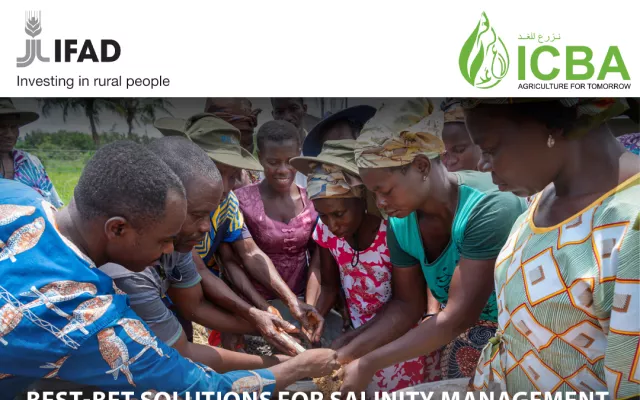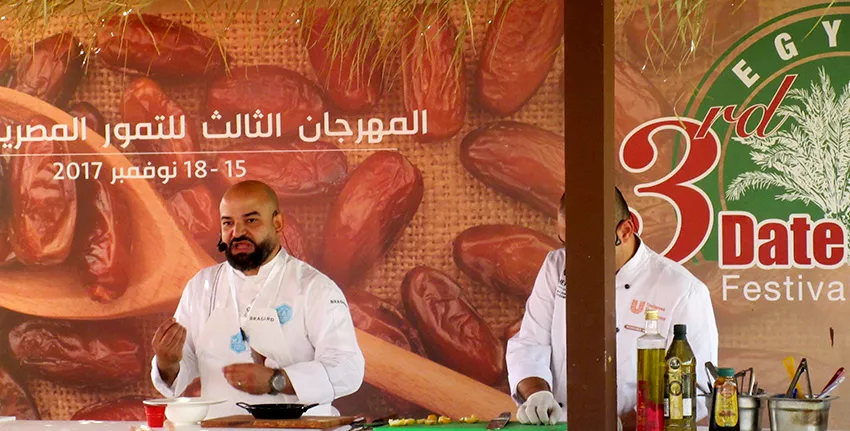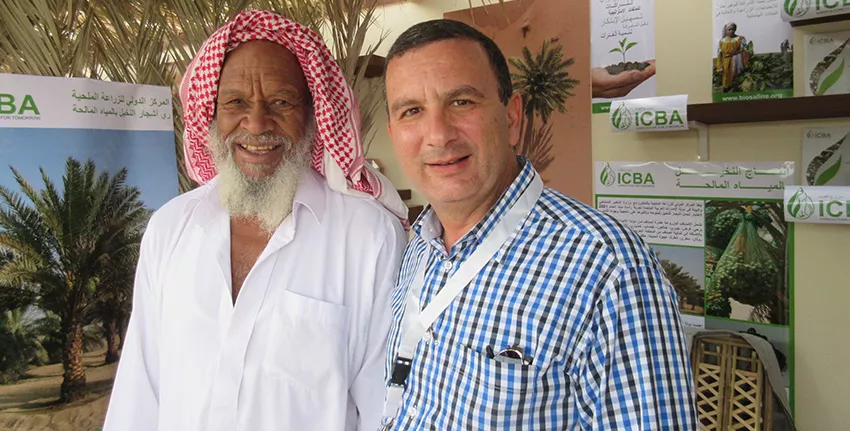ICBA showcases date palm research results at international festival in Egypt
18 November 2017
The International Center for Biosaline Agriculture (ICBA) recently presented the results of its long-term date palm research program at the 3rd Date Palm Festival in the Siwa Oasis, Egypt.
Held on 15-18 November 2017 under the auspices of Egyptian President Abdel Fattah Saeed Hussein Khalil el-Sisi, the festival attracted a large number of local, national and international organizations, companies, farmers and the general public.
Invited by the Khalifa International Award for Date Palm and Agricultural Innovation (KIADPAI), ICBA was among 250 exhibitors, and one of a few research organizations, to showcase its date palm research during the festival.
The festival was organized by the General Secretariat of KIADPAI in collaboration with partners in Egypt including the Ministry of Commerce and Industry, the Food and Agriculture Organization of the United Nations (FAO) and the United Nations Industrial Development Organization (UNIDO) as strategic partners. Other partners included the Ministry of Agriculture and Land Reclamation, the International Date Palm Network, Matrouh Governorate, the Date Palm Friends Society, the Siwa Society for Tourism Services and Environment, the Siwa Association for Community Development and Environmental and Chamber of Food industries in Egypt.
During the four-day event, ICBA’s exhibition booth received over 200 visitors, including farmers and delegates from both public and private sectors, who were keen to learn about ICBA’s research and development work related to date palm. The delegates particularly learned about irrigating date palm trees with saline water, using date palm trees for landscaping in highly saline areas, soil amendments and biochar for date palm trees, producing biochar from the residues of date palm trees, and using arbuscular mycorrhizal technology for date palms.
Among the high-profile visitors were H.E. General Alaa Abu Zaid, Governor of Marsa Matrouh Governorate, and Dr. Abdelouahhab Zaid, Secretary General of KIADPAI. H.E. General Alaa Abu Zaid learned about ICBA’s research and development efforts in different regions and suggested that ICBA should have development projects in the Siwa Oasis in collaboration with KIADPAI.
During a meeting with ICBA’s representatives, Mr. Mohammed Suhail Al Mazrouei, CEO of Liwa Dates, said: “We would like to have collaborative projects with ICBA, particularly to estimate water requirements of date palm trees as inappropriate irrigation costs a lot to our company. We would therefore like to discuss these issues with relevant scientists and explore potential collaboration.”
Since 2001, ICBA has been working extensively with its partners, specifically the Ministry of Climate Change and Environment of the United Arab Emirates (MoCCaE), to study several elite date palm varieties for salt tolerance. The research program on date palm has proved to be very successful in, among other things, evaluating salinity tolerance among elite date palm varieties in the Arabian Peninsula; determining the long-term impact of different levels of salinity on date palm growth and productivity; and investigating the impact of irrigation water salinity on date palm quantity and quality.
Over the years ICBA scientists have evaluated more than 270 date palm trees through a series of experiments, which have helped to identify varieties that fare better than others under saline conditions.
For its continuous efforts on date palm research, ICBA has received several awards including the prestigious Khalifa International Award for Date Palm and Agricultural Innovation.











